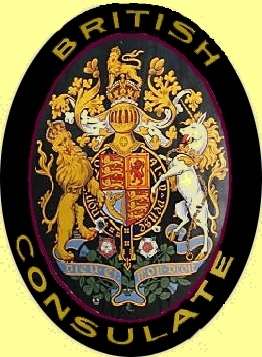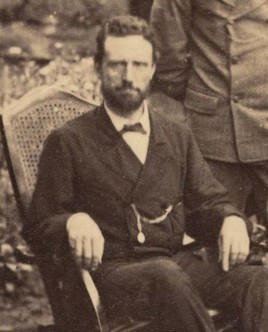|
William Marsh Cooper was Acting Consul at Taiwan from 14 June 1869 to 19
January 1870, and was based at Tainan and Takow. He succeeded John
Gibson and was replaced by Archer Rotch Hewlett.
William Marsh Cooper was born on 7 September 1833
at St. Peter’s Mancroft, Norwich, Norfolk, the eldest son of William
Cooper, a Barrister, and Anna Cooper née Marsh. He entered King’s
College, London, in 1852 but did not graduate, being recruited into the
China Consular Service from the China Class in October 1854 (Thomas
Adkins was in the same recruitment). Cooper’s first appointment was on 6
March 1855 as a Supernumerary Student Interpreter at the Amoy [廈門]
British Consulate. William Cooper’s abilities were noticed early on for
he was next appointed as Assistant to (Sir) Harry Smith Parkes, one of
the three commissioners of the Allied Commission Canton, which had veto
power over all decisions affecting foreigners following the downfall of
the Imperial Commissioner Yeh Ming-ch’en [葉名琛] in 1858. He was promoted
quite rapidly, becoming a First Assistant in 1860 and an Interpreter in
1866. From 1860 until his arrival in Taiwan in 1869, Cooper was based at
the British Consulate on Double Island [媽嶼], Swatow [汕頭].
On 18 February 1865 William Marsh Cooper married
Mary Louisa Tickell, the daughter of Colonel Samuel Richard Tickell and
Maria Georgiana Tickell née Templer, at St John’s Cathedral, Hongkong.
Cooper’s first two children were both born at Swatow: Philip Templer
Cooper, born 24 March 1866; and Harry Ashley Cooper, born 15 July 1867.
The whole Cooper family plus two servants travelled to Taiwan to take up
the new posting.
William Marsh Cooper arrived at Taiwan-fu on 12
June 1869 and took charge of the British Consulates at Taiwan and Takow
from Acting Consul John Gibson on 14 June 1869. As well as his wife Mary
and two infant sons, Cooper arrived with his butler and the children's’
nurse from Swatow, who had agreed to come only when her salary was
raised by a third. Before John Gibson left he briefed Cooper on the
happenings under his Acting Consulship: Gibson explained that the old
Tao-t’ai [道臺], or Circuit Intendant, Liang Yuen-kuei [梁元桂], was awaiting
relief and until he was relieved he was suspended from all dealings with
foreign interests. Liang was finally relieved on 22 October 1870 by Li
Chao-t'ang [黎兆棠], but problems over the camphor trade persisted. The
Formosa camphor monopoly may have been declared illegal under the terms
of the Treaty of Tientsin, but the new Camphor Regulations circulated to
British firms by Cooper on 17 November 1870 seemed just as contentious.
There were two firms interested in the camphor trade, Tait & Company and
Elles & Company, and when a boat carrying camphor for Elles & Company
was pirated in October 1870, it was to set in place a chain of events
that would only be resolved by the arrival of the next Acting Consul,
Archer Rotch Hewlett.
While on Formosa, Cooper was asked by Sir
Rutherford Alcock, the British Minister at Peking, about the living
costs on the island. Cooper considered that there were many
inconveniences at such a small port; however, he praised the abundant
fruit that was available year round and the succulent oysters. The
Coopers also relied on home-raised fowl as fish was not always
available. Vegetables were a problem as they could find no palatable
local ones and it was impossible to grow their own on the sea sand which
formed their garden at the Takow Consulate on Ch’i-hou [旗後]. The Coopers
were thus obliged to eat tinned vegetables at considerable expense.
Fresh water also was a problem, being brackish from the well at
Ch’i-hou, and had to be brought across from a small stream at the base
of Ape’s Hill [猴山]. While sugar and rice, grown abundantly on Formosa
and exported, were naturally very cheap; cheese, butter, potatoes and
biscuits were expensive luxuries. Cooper described south Formosa as a
dreary place with a hot, feverish unhealthy climate, and indeed in his
last months Cooper had contracted an intermittent but persistent fever.
He found the native people to be friendly, and attributed this to some
extent to the actions taken by his predecessor John Gibson, but
despaired of the venal and greedy Mandarins who ruled the island.
Shortly before his departure, a daughter, Beatrice Alice Cooper, was
born to William Marsh Cooper and Mary Louisa Tickell on 5 January 1870
at the British Consulate, Takow. On 19 January 1870 Cooper was relieved
by Archer Rotch Hewlett, and he and his family and servants returned to
Swatow.
William Cooper returned to Swatow and was
appointed Acting Consul on 15 February 1870; on the following day, 16
February, his six week old baby, Beatrice Alice Cooper, died. Cooper was
very sick from the fever he had contracted fever on Taiwan and, after
the death of his daughter, took Home Leave on medical grounds. After his
return from England, Mary Louisa Cooper gave birth to their youngest
child, Alan Leslie Cooper, who was born on 10 August 1875 at Shanghai
[上海].
Cooper was finally promoted to Consul on 9
November 1877, when serving as Acting Consul at Ningpo [寧波], and saw out
his days in the China Consular Service as the Ningpo Consul. Though
plagued by ill-health, Cooper needed money for his sons’ educations and
could not afford to stop working. However, Cooper finally took early
retirement on the grounds of ill-health on 1 April 1888. William Marsh
Cooper returned to England and died on 16 April 1896 at 35 Waverley
Road, Southsea, Hampshire. His wife, Mary Louisa Cooper, despite her
health problems in China, lived on until the age of 92 and died on 22
October 1938 at Madeley Road, Ealing, Middlesex.
His eldest son, Philip Templer Cooper born 24
March 1866, joined the Royal Artillery. On 5 September 1901, Major
Philip Templer Cooper married Evelyn Mary Close, the daughter of Douglas
Richmond Close and Isabella Melvill, at the Holy Trinity Church,
Weymouth, Dorset. Philip Cooper retired as a Lieutenant-Colonel and died
on 7 June 1934, aged 68.
Harry Ashley Cooper, the second son born on 15
July 1867, joined the Indian Army Service Corps. On 1 July 1902 Captain
Harry Ashley Cooper married May Somerville Bunny, the 18-year-old
daughter of Major Frank William McTier Bunny and Caroline Stanley Todd.
Major Harry Ashley Cooper of the 62 Punjabis died aged 37, on 5 January
1905 at Fyzabad, Bengal, India. Interestingly, his widow, May Somerville
Cooper, remarried twice and was the mother of the movie actor Peter
[Sydney Ernest] Lawford.
Alan Leslie Cooper, the youngest son born on 10
August 1875, was educated at Haileybury and joined the Imperial Light
Horse and later the Royal Engineers.
He fought in the Anglo-Boer War from 1900 to 1902, and was a Major in
the First World War, where he won a DSO (Distinguished Service Order) in
1915. Alan Leslie Cooper married Elizabeth Sarah Russell on 21 August
1902 at Southsea, Hampshire. A Fellow of the Zoological Society, Alan
Leslie Cooper died on 19 November 1956, aged 81.
|

